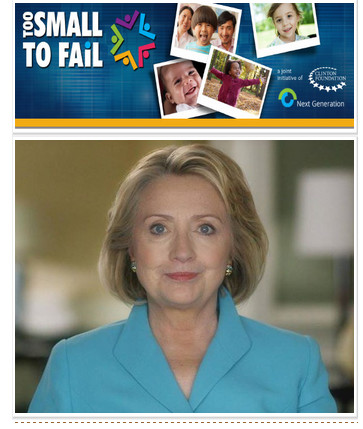From Hillary Clinton's Too Small to Fail: First Teachers and Nurturing Empathy

Sometimes,
very young children can be highly attuned to the emotional state of
others—crying when they see a parent or sibling cry, for example. Other
times, they can appear insensitive, ignoring a child’s cries or pointing
out differences that make adults wince. The ability to relate to how
others feel, or empathy, is learned in different ways throughout a
person’s life and while not always readily apparent in babies or
toddlers, it is an important skill to learn that contributes to success
in school and beyond.
Empathy is closely linked to social and
emotional development, and researchers agree that people who show strong
empathy for others tend to have better social interactions, and do
better in school and at work. This kind of prosocial behavior—behavior
that benefits others—is an asset in building relationships and in
developing moral behavior. Like other social and emotional skills,
empathy is best nurtured in infancy by a parent or caregiver.
Talking
about feelings is a great way to start this process. In order to help
children develop the positive benefits of empathy—without becoming
emotionally distressed by the pain of others—parents and caregivers can
use every day moments to teach these important life skills. For example,
if a child observes another fall down, a parent can explain how that
child may feel and then model empathic behavior by asking the fallen
child if he’s okay or needs help.
Parents can also help their
children understand that it feels good to help others in need by being
affectionate and responsive to their children’s needs.
Resources for Sharing:
- Find tips here for improving the social and emotional health of children from birth through age three, from the experts at ZERO TO THREE.
- This article from PBS offers tips for nurturing emotionally secure, confident children—from infancy.
Even
if parents don’t see themselves as teachers, they are their children’s
first—and often, most!—important teachers. From even before birth,
babies learn to recognize the sound of their mother’s voices and learn
about their environment. And after birth, babies look to parents to help
them make sense of the world around them, from new foods to new
experiences. Every book that is read, song that is sung, or story that
is told is an opportunity for parents to teach their young children
about their environment, boost their vocabulary and build closer bonds.
But
parents aren’t the only teachers in a young child’s life. Increasingly,
grandparents play the role of primary caregivers to young children and
foster their physical, emotional and cognitive development. According to
AARP, almost 3 million grandparents in the United States serve as
primary caregivers for their grandchildren. These grandparents provide
an important way for young children to learn important skills from older
adults, as well as family history.
Older siblings also play a
very important role in young children’s lives by offering guidance on
simple activities or social customs. New research shows that the
learning that takes place between younger and older siblings is
spontaneous and two-sided—meaning that older siblings often offer
instruction to younger siblings without being asked, but younger
siblings often ask their older siblings how to do things, too.
While
young children can learn from every person they encounter, it is the
ones who engage with them on a daily basis—be they parents,
grandparents, siblings or preschool teachers—that best inspire a child’s
life-long curiosity and love for learning.
Resources for Sharing:
- Tips and information
from AARP for grandparents who serve as their grandchildren’s primary
caregivers, from important medical records to legal issues.
- Ideas for fun activities that support early learning, from our friends at ZERO TO THREE.
- 20 tips for parents from preschool teachers about how to get the most from your toddler.
- This blog post from Too Small to Fail reveals how one family’s youngest teacher helps his sister learn.

